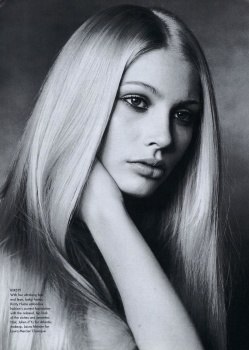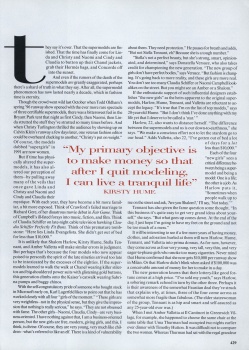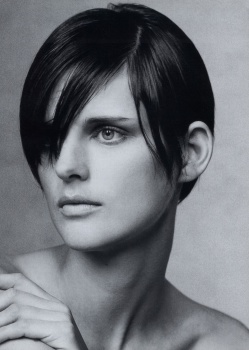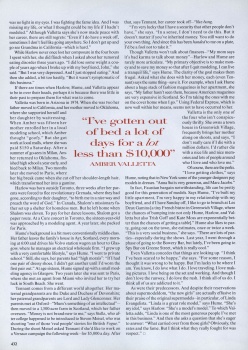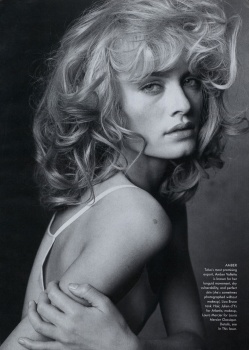versustito
Well-Known Member
- Joined
- Apr 19, 2006
- Messages
- 11,153
- Reaction score
- 944
The F/W 2026.27 Show Schedules...
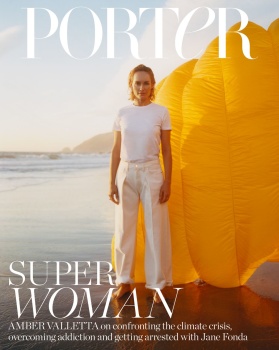
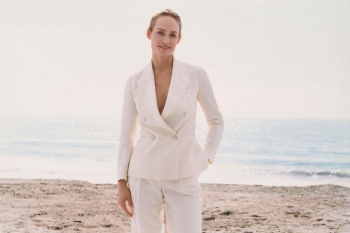
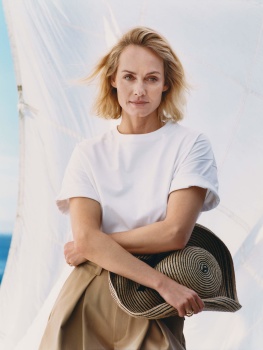
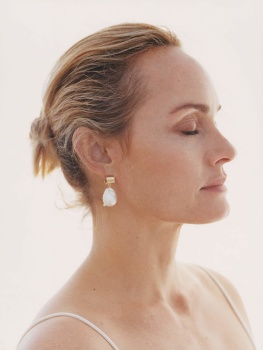
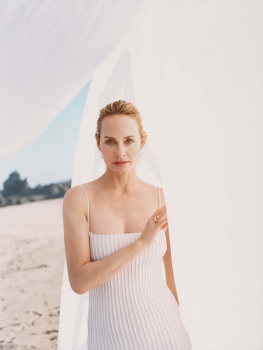
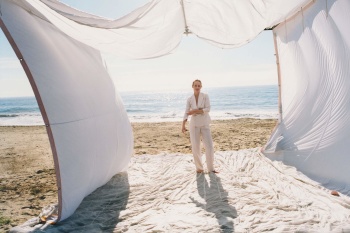
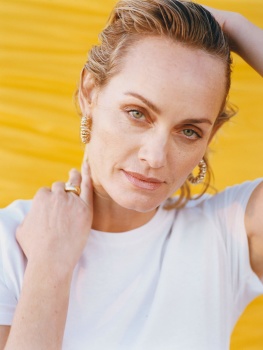


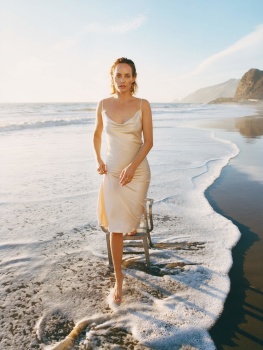

net-a-porterAs one of the original ‘Supers’, AMBER VALLETTA was a name associated with style and glamour, not climate and conservation. These days, though, the actor and activist is right in there – getting loud and getting arrested, protesting and putting herself on the line. Here, modeling our new-season edit of sustainable clothing, she talks to EVE BARLOW about fashion, faith and her greatest fear.
Amber Valletta is a straight shooter. She doesn’t want to sleepwalk into the abyss. She’s a leader in sustainability in fashion, an activist who was arrested in Washington, DC, alongside Jane Fonda during climate-change protests in November last year. The roots of her environmentalism trace back to her rural upbringing with her mother in Tulsa, Oklahoma. Her grandparents had a farm that she spent weekends running around, making forts, playing in the hay. “My best memories are of outside,” she says from an outdoor restaurant in the Palisades, a coastal neighborhood in LA that she now calls home. In the summer, they’d go to the Blue Whale of Catoosa, off Route 66, which sits next to a man-made lake. “It was a brown pond, full of snakes and sh*t. We loved it!”
She remembers, too, her mother’s arrest alongside a group of Native American activists who were protesting against the building of a power plant. “My mom wore a band that said ‘NO NUKES’.” They succeeded. Before Valletta participated in the recent DC protest, she spoke to her mother over the phone about her memories. “I chose to get arrested,” she says. “I’ve been feeling this need to get loud; to step into my own. I don’t care what anyone thinks. I can’t sit on the sidelines; I need to physically put myself on the line. I chose to get arrested as a symbol. My life is worth putting out there, in order to show that all our lives are worth fighting for.”
She begins to grow emotional. Her eyes get puffy, her voice breaks. You can hear fear, anger and faith. “I believe in this. I will risk public opinion, being in jail,” she says. She recounts walking to a street between the Supreme Court and Capitol Hill and yelling. As she was arrested, she could see those buildings. “It was profound. This is the most important crisis we’re facing. I’m not diminishing cancer or Aids, diabetes or addiction, but there won’t be anything left to fight for. Nothing else matters.”
Valletta is the type of communicator who makes you remember the privilege of being alive – and appreciate the natural world that surrounds us. “It makes me want to cry. I’ll be dead, but my great-grandkids? To live in a world where they wouldn’t experience this; where they couldn’t see elephants or a whale. The ocean could be disgusting and full of plastic; you can’t eat fish, go to a beach, see coral; you can’t have the opportunity to be doctors, scientists or creators. We take it for granted. It’s overwhelmingly ridiculous.”
In the ’90s, Valletta wasn’t known for environmentalism but for fashion. She’s been on the cover of American Vogue 16 times. She belonged to the era of the ‘Supers’ and flat-shared with fellow ’90s icon Shalom Harlow. She modeled for Prada, Gucci, Versace et al. The first act of her life was a whirlwind. “I started modeling at 15!” Within a few years, she was making more money than she’d ever known. “I started feeling a big disconnect. I couldn’t quite work out what it was. I vacillated from being melancholy to being overwhelmed with anxiety to partying.” After relocating to LA and having a child in 2000 with her ex-husband Chip McCaw, she transitioned into acting and made her first major film appearance in Robert Zemeckis’s What Lies Beneath.
Valletta took environmental-related classes at NYU in the wake of Al Gore’s early conversations around climate change. “At first it was all about the ozone, remember?” she says. California and new motherhood woke her up. “I believed in conservation, in protecting people from chemicals in food.” She joined the NRDC (Natural Resources Defense Council) to lobby in Sacramento for a Long Beach clean-up. Before long, she realized the fashion world was lagging.
Valletta is currently looking to fund a documentary called The Changing Room. “We want to educate and entertain fashion consumers on sustainability. Fashion has such an opportunity to be a change agent.” She is a bottomless pit of advice. Her tip to those looking to shop more ethically is investment purchasing. Her universal wardrobe? “Everyone can wear a tank top or a great T-shirt. Have a blouse or two. In general, luxury brands don’t overproduce, so they’re safe bets. I believe in a great blazer, a pair of boots and tennis shoes. They’re my go-tos.” Brands that don’t advertize their ethical efficiency are even more bamboozling to Valletta. “They’re afraid they’re not doing enough. My response is to at least put it on tags, like ingredients. The lack of transparency is causing us to stay in the 20th century. We’re already 20 years into the 21st century!”
As for her son, Auden, 19, she encourages him to make choices based on purposefulness. Valletta tells him that whatever path he chooses needs to be of service. “His generation has no other option,” she says. “You don’t have the option to be a stockbroker or a lawyer to get rich. You can have fun, but you can’t be self-serving.”
Fun propelled Valletta when she was his age. She wanted to go to Europe for the summer. “I didn’t know anything about modeling. I liked to act. I thought you magically became famous!” In Milan, Valletta got the bug for independence. Modeling felt like acting. The following summer, she returned and found herself in a studio with every Italian Vogue cover along the wall. Valletta was new to the world of fashion. She’d never heard of photographers like Steven Meisel, Francesco Scavullo, even Peter Lindbergh. She pulled a Linda Evangelista cover. “At the time, I didn’t know who she was,” she says. “She was a character. I realized, that’s the kind of work I want to do – to tell interesting stories.”
When she was 18, she scored her own Vogue cover. “When I had my hair cut short, that changed everything,” she says. The decision was inspired on the set of a French shoot with hairdresser Yannick D’Is. “I was 17 and looked way older. Nobody had short hair then. Grunge hadn’t happened. I told him – I want to cut my hair, and he said, ‘Not necessary’. He asked how old I was, and his mouth hit the floor: ‘You should definitely cut your hair.’ Suddenly, I went from ‘that girl’ to ‘who’s that girl?’”
She lived with Harlow, and befriended Kate Moss and Christy Turlington. The ’90s supermodel clique pre-dated today’s empowerment rhetoric. Did it feel feminist? “Nobody was thinking about whether we were making a statement,” says Valletta. The “sisterhood” keeps in touch (Valletta sees Moss in London). It was a safety net within the pressure cooker. “You’d fight with each other, cry with each other, support each other, lose jobs to each other, all of it.”
There was less ego-baiting, too, at least in public. “You would never have taken your Polaroid camera and turned it around on yourself,” she scoffs. “You would never have talked about how you were flying around in a private jet. That’s why when Linda [Evangelista] made that one statement [“I never get out of bed for less than $10,000 a day”], it was huge. People talk like that all the time on Instagram now. People who don’t even do anything!” Valletta personally hates selfies. “It makes me painfully uncomfortable. I want things to change – that’s all I care about now.”
A few years ago, Valletta did have reason to turn the camera on herself. She came out as an addict. She’s been sober for 25 years. “I didn’t think anyone would see,” she laughs of a speech she made for MindBodyGreen at an invite-only event that has since been shared online. In it, she talks about her drug and alcohol abuse during her heyday. “I didn’t have a problem when I was out using, if you saw me high or drunk. So why would I be ashamed of being clean and saying: I have a disease that I can’t control?” she says. “Only by being sober do I have any chance of survival. Left to my own devices, I guarantee you no matter how much I love life, my family, if I take a drink or any of my drugs of choice, I’ll be dead. I’ll ruin everything.”
It all boils down to accountability. With the dawn of a new decade, Amber Valletta is laser-focused. “I want to be the person that I aspire to be,” she concludes. “I don’t want to talk it, I want to live it. I want to allow myself the space to have bad days, be sad, be mad, be loving and accepting of others. Even people that I don’t think are right. It’s hard to do, but I want to move through the world as gently as I can.” In her hands, the world feels a little safer already.



